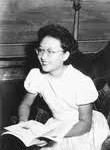By his very nature, David Lang rethinks everything we think we know about any given avenue of music. And with the whisper opera, which was performed over the weekend of Aug. 10 at Lincoln Center's Mostly Mozart Festival, he did so by going to the polar opposites of what theater audiences are used to: Quietude, revelations of the most intimate sort and a level of fragmentation … [Read more...] about David Lang’s anti-opera: Where secrets become art
Britten’s Curlew River: Tanglewood’s Madwoman makes sense through the art of subtraction
Benjamin Britten could be so comforting when at his most dictatorial. His advice to performers was simple: Do exactly what he wrote, no more and no less, and all will be well. Certainly that seems true in his instrumental works, performances of which have acquired a uniformity (or quality control, in the composer's mind). But what about theatrical matters? Does his word … [Read more...] about Britten’s Curlew River: Tanglewood’s Madwoman makes sense through the art of subtraction
What Stockhausen left for us Earthlings
Karlheinz Stockhausen made it his business to be enigmatic - which is the core cause of his being modern music's greatest public relations disaster. Long before he made his 9/11 gaffe ("And that is the greatest work of art that exists for the whole Cosmos"), long before he revealed that he had extra-terrestrial origins (he claimed to be from a planet orbiting the star Sirius), … [Read more...] about What Stockhausen left for us Earthlings
Living Blind: In plays, operas and restaurants
Rarely pleasant and all-too-familiar, stumbling blindly into uncertain darkness - whether bicycling down a nighttime country road or solving a near-impossible problem - is an accepted fact of adult life. But not everybody wants to attend an opera that embraces that condition - starting with the blindfolds that audiences were required to wear throughout The Blind, Lera … [Read more...] about Living Blind: In plays, operas and restaurants
David Oistrakh in China – and other Russian footprints in Asia
Russia's cultural invasion of China was relatively short - roughly 1952 to 1961 - but left a lasting mark, despite efforts to stamp it out. The evidence is increasingly visible. In the lobby of the Shanghai Concert Hall, two manuscript pages from Tchaikovsky Symphony No. 6 are framed. How did they survive Mao's Cultural Revolution? Inside the hall, the Shanghai … [Read more...] about David Oistrakh in China – and other Russian footprints in Asia






